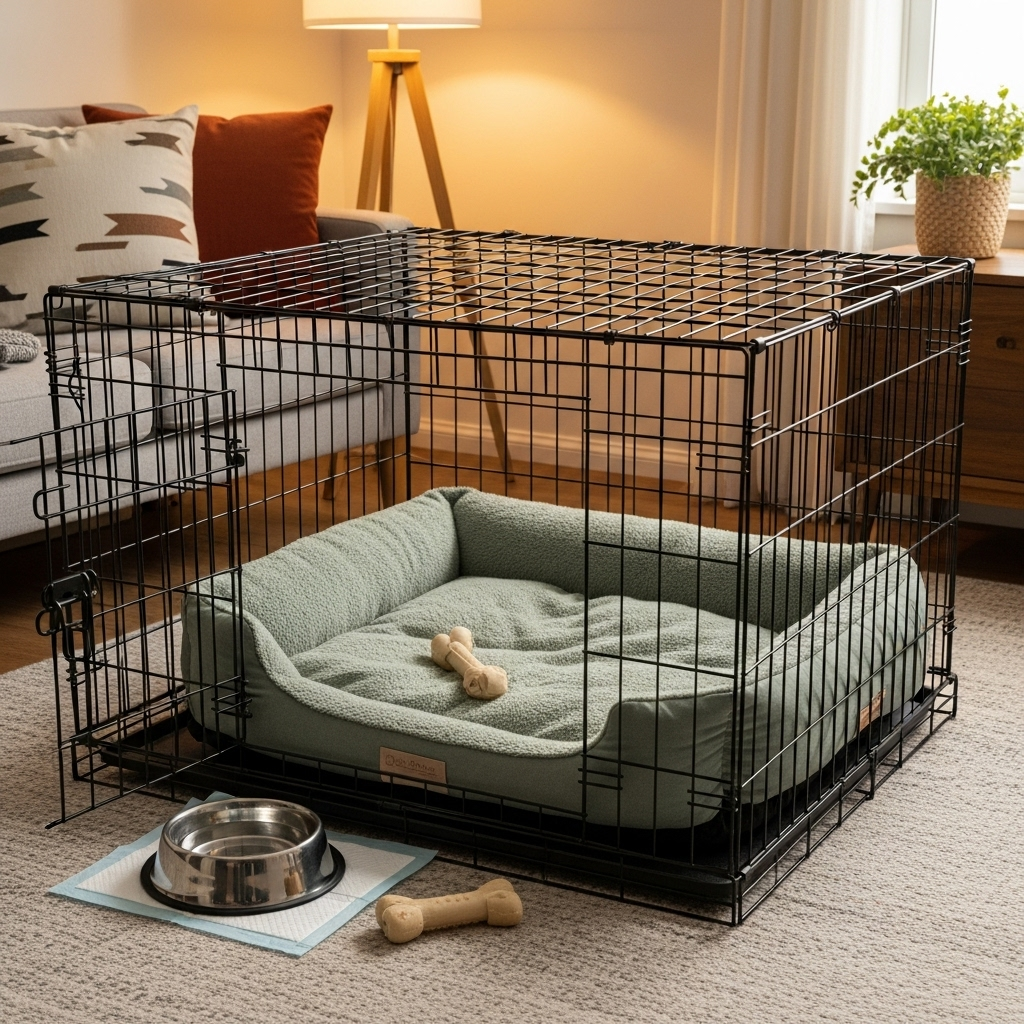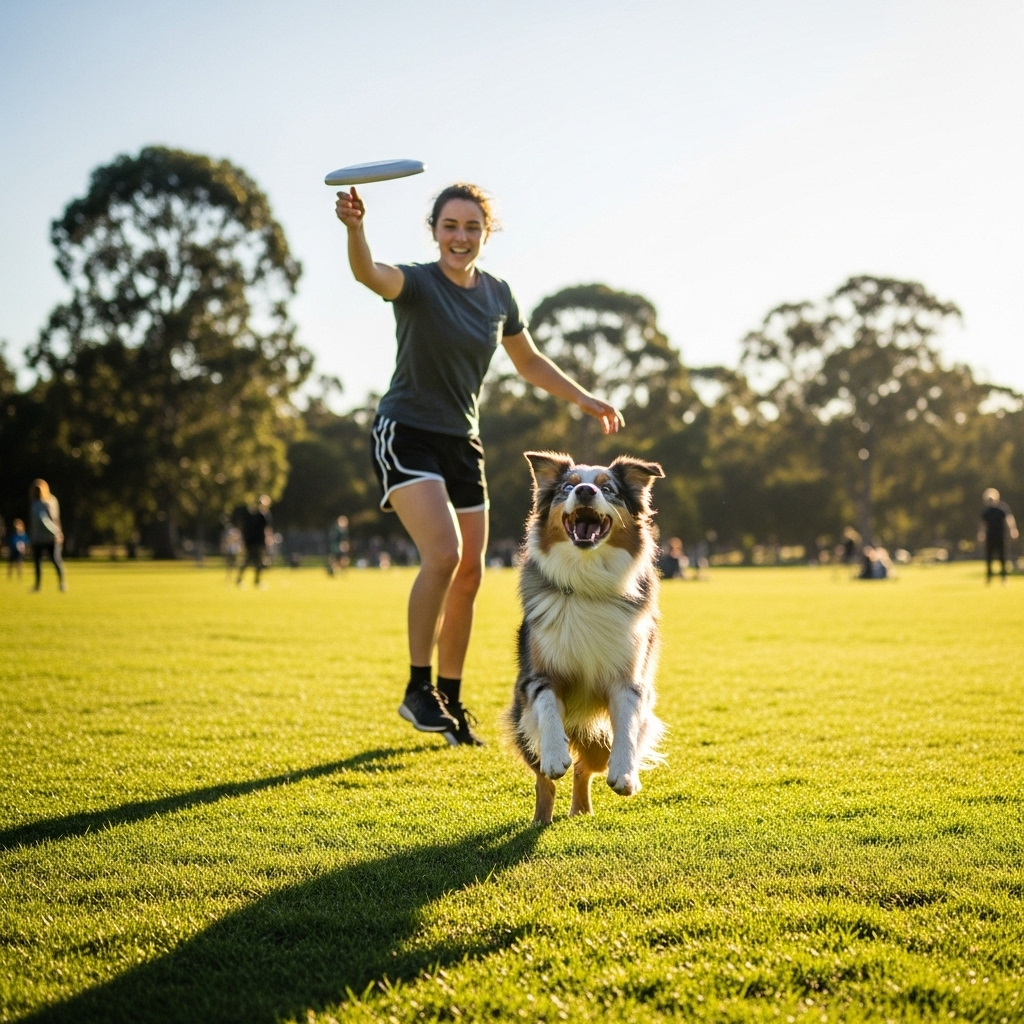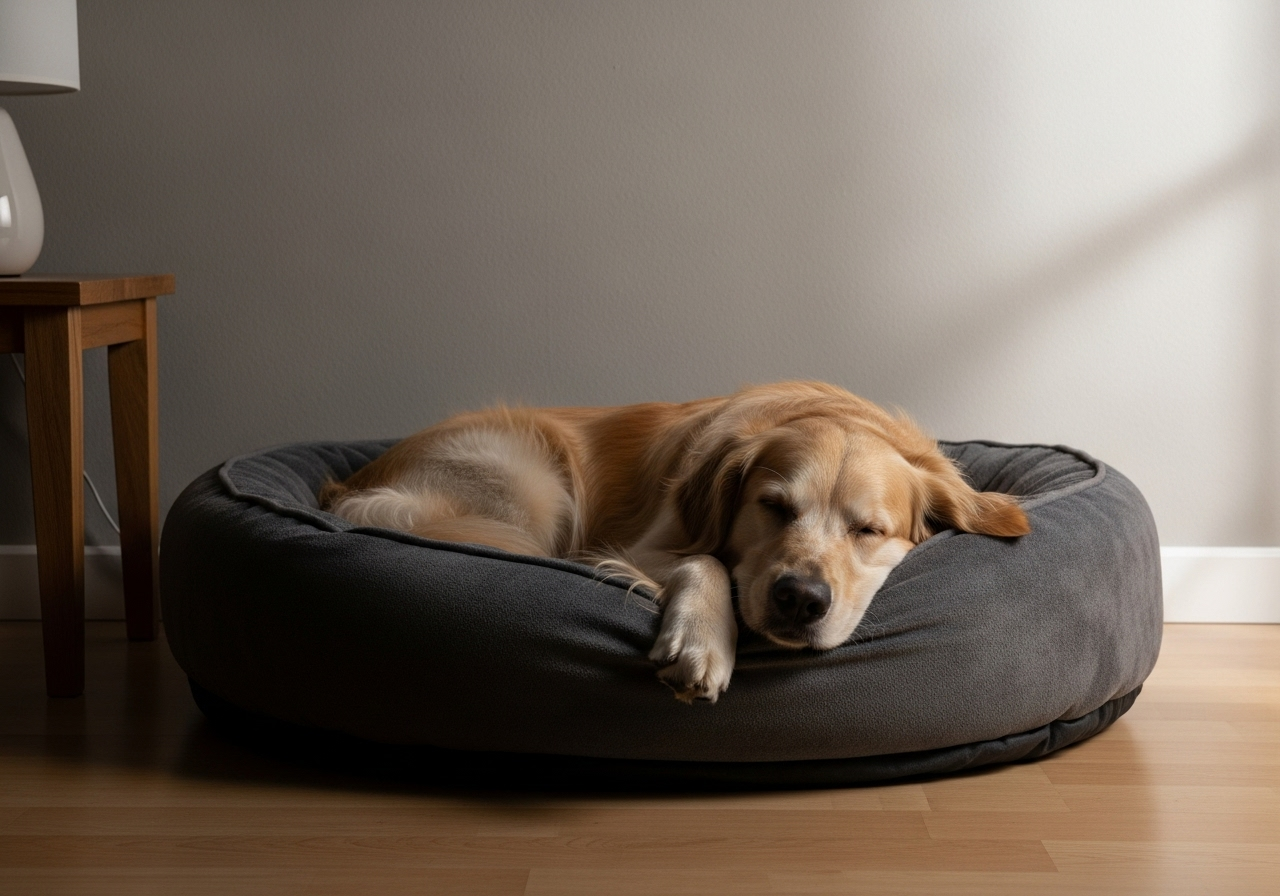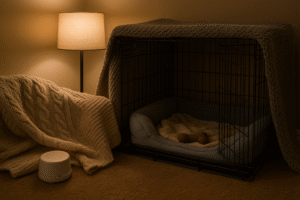Disclaimer: This article is for informational purposes only and does not constitute medical advice. If you are dealing with a dog barking at night or have any other health concerns regarding your pet, please consult with your licensed veterinarian. They can perform a physical examination, make a diagnosis, and recommend the best course of action.
Table of Contents
That piercing bark in the dead of night. It’s a sound that can fill any pet owner with a mix of frustration and worry. Is my dog okay? Are the neighbours going to complain? Am I ever going to sleep again? If this sounds familiar, you are not alone.
Key Takeaways
- Barking is Communication: Nighttime barking isn’t just noise; it’s your dog’s way of telling you something is wrong. Common triggers include environmental noises, loneliness, pent-up energy, or underlying medical pain.
- Medical Issues First: Sudden, persistent dog barking at night warrants a vet visit. Pain from arthritis, dental disease, or age-related conditions like Canine Cognitive Dysfunction can be a primary cause.
- Routine is King: A tired dog is a quiet dog. Ensure your dog gets plenty of physical exercise and mental stimulation during the day to burn off excess energy before bed.
- Create a Safe Haven: Your dog’s sleeping area should be a sanctuary, dark, quiet, and comfortable. Consider using white noise machines or blackout curtains to block external triggers.
- Gentle Training Works Best: Never punish your dog for barking. Instead, use positive reinforcement to teach and reward quiet behaviour. A consistent, calming bedtime routine can also work wonders to stop a dog barking at night.
Why is My Dog Barking at Night All of a Sudden? Understanding the Root Cause
You can also visit: https://doglifeexpert.com/fecal-pcr-test-for-dogs-5-crucial-facts/

When a dog that normally sleeps soundly starts barking at night, it’s a signal that something has changed. In my years of practice in Ottawa, I’ve found that owners often focus on the barking itself, but the key is to uncover the why. Broadly, the reasons a dog is barking at night fall into two categories: medical and behavioural.
According to the Merck Veterinary Manual on Behavioural Problems of Dogs, vocalisation is a complex behaviour with a wide range of triggers. It’s our job as owners and vets to play detective.
Medical Reasons: When Barking Signals Pain or Discomfort
Before exploring behavioural solutions, it’s crucial to rule out physical discomfort. Pain is a powerful motivator for vocalisation. Conditions I frequently see causing nighttime distress include:
- Arthritis: Joint pain often worsens at night after a day of activity or when lying still for long periods, leading to a dog barking at night from discomfort.
- Dental Disease: A painful toothache doesn’t go away when the sun goes down.
- Gastrointestinal Upset: Nausea or cramping can make it impossible for a dog to settle.
- Canine Cognitive Dysfunction (CCD): Similar to Alzheimer’s in humans, CCD can cause confusion, anxiety, and altered sleep-wake cycles in senior dogs, which is a primary reason for a dog barking at night. I recall a 14-year-old Golden Retriever named “Sadie” whose owner was at her wits’ end. Sadie had started waking and barking incessantly around 2 a.m. An exam and a detailed history pointed towards CCD. As noted in scientific literature within journals like the Journal of the American Veterinary Medical Association (JAVMA), managing these cognitive changes is key to restoring peace. With a management plan, Sadie’s nighttime episodes became much less frequent.
Behavioural Triggers: Loneliness, Fear, and Environmental Noises
If your veterinarian gives your dog a clean bill of health, the cause of the dog barking at night is likely behavioural.
- Boredom and Pent-Up Energy: A dog that has been snoozing all day may simply not be tired at bedtime. Their energy reserves are full, and barking becomes an outlet.
- Separation Anxiety and Loneliness: Dogs are pack animals. Being isolated in a room by themselves can trigger anxiety and a deep-seated instinct to call out for their family.
- Environmental Noises: A dog’s hearing is far more sensitive than ours. The clatter of a garbage can, a passing car, or nocturnal wildlife like raccoons can be perceived as a threat, prompting an alert bark.
5 Gentle & Vet-Approved Methods to Stop Dog Barking at Night
Once you have a better idea of the cause, you can implement a targeted strategy. The goal is never to punish the dog barking at night, but to address the underlying need.
Method 1: Create a Sanctuary: Optimise Their Sleep Environment

Your dog’s sleeping area should feel like a safe, peaceful den, not a place of isolation.
- Location, Location, Location: If your dog suffers from loneliness, moving their bed or crate into your bedroom can be a game-changer. Feeling your presence can provide immense comfort.
- Block Out Stimuli: Use blackout curtains or blinds to prevent your dog from seeing every passerby or squirrel.
- Mask the Noise: A white noise machine, a fan, or even classical music can help drown out startling external sounds that trigger barking.
Method 2: Perfect the Daily Routine: The Power of Exercise & Enrichment

The old saying, “a tired dog is a good dog,” is veterinary-approved wisdom. A lack of stimulation is a very common reason for a dog barking at night.
- Physical Exercise: Ensure your dog gets at least 30-60 minutes of vigorous exercise daily, adjusted for their age and breed. A long walk or a game of fetch in the evening can help burn off that final burst of energy.
- Mental Stimulation: Mental fatigue is just as important as physical fatigue. As research in publications like the Journal of Veterinary Behaviour highlights, activities that engage a dog’s brain, like agility training or puzzle toys, can reduce stress-related behaviours. Using food puzzles for their dinner can turn a 2-minute meal into a 20-minute brain game.
Method 3: Rule Out Medical Issues with a Veterinary Visit
I cannot stress this enough: if the dog barking at night is a new and persistent behaviour, your first call should be to your veterinarian. As outlined in essential texts like Blackwell’s Five-Minute Veterinary Consult, a thorough physical exam is the first step in diagnosing any problem. We can check for signs of pain, run blood tests to look for systemic issues, and discuss signs of cognitive decline in older pets.
Method 4: Implement Calming Bedtime Rituals

Dogs thrive on routine. A predictable sequence of events before bed can signal that it’s time to wind down.
- Last Call: A final, calm potty break right before you turn in for the night is essential.
- Wind-Down Activities: Avoid high-energy games in the hour before bed. Instead, opt for quiet activities.
- Enrichment Tools: A lick mat with a smear of plain yoghurt or a safe chew toy can keep their mind occupied and promote calmness. The act of licking is naturally soothing for dogs.
Method 5: Use Positive Reinforcement Training
Your reaction to the dog barking at night can either solve the problem or make it worse. Shouting or punishing your dog often increases their anxiety and can escalate the barking. Instead, focus on rewarding silence.
The “Quiet” Command:
- When your dog starts to bark, wait for a brief pause.
- The moment they are quiet, say “Quiet” in a calm, firm voice and give them a high-value treat.
- Gradually extend the duration of silence required before they get the reward. This teaches them that quiet behaviour earns them good things.
This method takes patience, but it addresses the behaviour in a way that builds trust, which is a core tenet of practical management strategies found in resources like the Saunders Manual of Small Animal Practice.
At-Home Checklist: Your 5-Minute Plan for a Quieter Night
Feeling overwhelmed? Use this checklist tonight to start tackling the dog barking at night.
- Evening Energy Burn: Did my dog have a good, long walk or an intense play session after dinner?
- Final Potty Break: Have I taken them out one last time right before bed?
- Secure Sleep Space: Is their bed comfortable, in a quiet location, and free from visual triggers (blinds closed)?
- Noise Control: Is there a fan or white noise machine running to mask outside sounds?
- Calm-Down Tool: Do they have a safe chew or food puzzle to help them settle?
When to See a Veterinarian: Potential Diagnosis & Costs in Canada
If at-home methods aren’t working after a week or two, or if the barking is accompanied by other symptoms like lethargy, appetite changes, or limping, it’s time to see a vet. The goal is to identify and treat any underlying issues causing your dog to bark at night.
Here’s a look at potential diagnostic steps and their typical cost ranges in Canadian dollars. Please note these are estimates and can vary by clinic and province.
| Service / Diagnostic Test | Typical Estimated Cost (CAD) | Purpose |
| Veterinary Consultation/Exam | $80 – $150 | To perform a full physical check-up and discuss the history of the dog barking at night. |
| Senior Wellness Blood Panel | $200 – $350 | To screen for underlying diseases that could cause discomfort, leading to a dog barking at night. |
| X-rays (Radiographs) | $250 – $600 | To check for arthritis or injuries that cause pain, a common reason for a dog barking at night. |
| Pain Medication Trial | $50 – $120 / month | To see if providing pain relief resolves the issue, confirm that pain is the cause of the dog barking at night. |
| Behavioural Consultation | $300 – $700 | An in-depth assessment with a vet behaviourist for complex cases of a dog barking at night. |
FAQs: Your Questions About Nighttime Barking Answered
1. Should I use a bark collar to stop my dog barking at night?
I strongly advise against punishment-based collars (shock, prong). They can increase fear and anxiety, worsening the underlying problem. Citronella spray collars may be a lesser evil, but they don’t address the root cause of why your dog is barking at night.
2. Will getting another dog help with the barking?
Sometimes, but it can also backfire. If the barking is due to loneliness, a companion might help. However, if it’s due to anxiety or noise reactivity, you might end up with two barking dogs instead of one.
3. How long will it take to stop my dog from barking at night?
It depends entirely on the cause. If it’s a simple environmental fix, you could see improvement in a night or two. For deep-seated anxiety or medical issues, it will be a more gradual process requiring patience and consistency over several weeks.
4. My puppy is barking at night in their crate. What should I do?
This is very common! Puppies have small bladders and can get lonely. Ensure the crate is a happy, safe place (never for punishment). It might help to have the crate in your room initially. Be prepared for a necessary potty break during the night.
A Final Thought on Quiet Nights and Happy Dogs
Dealing with a dog barking at night is exhausting, but it’s also an opportunity to understand your companion on a deeper level. Behind every bark is a reason, a need waiting to be met. By approaching the problem with empathy, a solid routine, and a willingness to seek professional guidance when needed, you can restore tranquillity to your home. The journey to silent nights strengthens the bond you share, paving the way for many peaceful years together.





Pingback: Puppy Potty Training: Your Ultimate 7-Day Success Plan